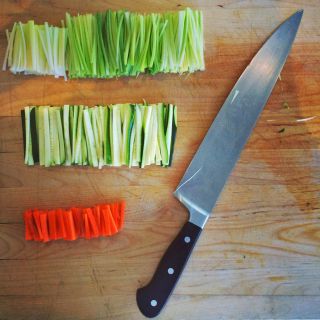Health
Kitchen Therapy: Cooking Up Mental Well-Being
Cooking a healthy meal nourishes your mind and feeds your soul.
Posted May 19, 2015 Reviewed by Ekua Hagan

At the end of a long workday, one of my favorite ways to unwind is by slicing and dicing vegetables for dinner. The steady chop, chop, chop of my knife against the cutting board quiets my mind and soothes my soul. Cooking is meditation with the promise of a good meal afterward.
Avid cooks have long recognized the therapeutic power of kitchen time. “Preparing a meal is unlike anything else I do in the course of a day,” says food writer Ellen Kanner, author of Feeding the Hungry Ghost. “It’s a nourishing, centering act that gets me to slow down and focus.”
Now culinary therapy is the treatment du jour at a growing number of mental health clinics and therapists' offices. It’s being used as part of the treatment for a wide range of mental and behavioral health conditions, including depression, anxiety, eating disorders, ADHD and addiction.
Recipe for a Healthy Mind
One obvious link between cooking and mental health is nutrition. It’s easier to control the quality of your diet when you prepare much of the food yourself. And there’s growing recognition that choosing a high-quality diet plays a major role in keeping your brain healthy.
The title of a recent editorial in The Lancet Psychiatry says it all: “Nutritional Medicine as Mainstream in Psychiatry.” It’s a concept that sounds more revolutionary than it probably should. Lead author Jerome Sarris, Ph.D., and his colleagues note that the brain operates at a very high metabolic rate, slurping up a supersized portion of the body’s total energy and nutrient intake.
Research has established a link between brain health and several nutrients, including omega-3 fats, B vitamins, iron, zinc, magnesium, and amino acids. To make sure that your brain is getting enough of these vital nutrients, it helps to know exactly what you’re feeding it.
A Dash of Mindfulness
In addition, the very process of cooking can nourish your psychological well-being. Marriage and family therapist Lisa Bahar, LMFT, LPCC, encourages her clients to practice mindfulness in the kitchen.
As an example, she describes peeling and sectioning a tangerine for a fruit salad: “Start by observing its skin—the color, the touch, the smell,” she says. Then, as you peel and section the fruit, notice the moment-to-moment sensations, such as the spray of juice when you break through the peel. Finally, pop one of the peeled tangerine sections into your mouth, and savor the juiciness and flavor.
When you’re focusing on the moment this way, you’re not ruminating over past slights or worrying about future problems. Mindfulness also helps reduce stress and promotes greater gusto for life.
A Splash of Appreciation
Once you’ve finished prepping your food, take a moment to reflect on how it reached your kitchen table. In the example of the tangerine, Bahar notes, a seed was planted, a tree grew, the tree blossomed and finally a tangerine appeared. “Then the tangerine was picked, put in a box, transported to a distributor, put in a bag and transported again to a supermarket,” Bahar says. A lot went into bringing the tangerine to you, and appreciating one little orange marvel may help you feel better about life overall.
A Sprinkling of Creativity
For many people, cooking is an outlet for creative expression. “Go off the book,” advises Kanner. “Think of the flavors you gravitate toward, and try using them in different dishes. Also, rather than dashing out to buy a long list of ingredients, be inspired by what you have on hand. It’ll save you time and stress, both of which tend to be barriers to creativity, and guess what? You’ll have developed your own new recipe.” The sense of accomplishment you feel afterward can be a boost for your self-esteem.
A Heaping Spoonful of Joy
It’s easy to dismiss cooking as just another household chore. Yet you may derive a joy from cooking that you simply don’t get from, say, folding laundry or dusting shelves. The reason: Eating is an innately rewarding experience. So cooking, which leads to eating, has a powerful, built-in reward system. To keep fun at the forefront, give yourself permission to play with your food. Kanner says, “People get so hung up on doing a recipe just like Ina Garten or making it come out just like it does on the Cooking Channel. Who says you have to?” Enjoy the process, and don’t worry about perfection.
Mix Well for Connection
Cooking with a partner can spur communication and cooperation. “Getting a meal on the table means putting aside differences and grudges and focusing on the task at hand,” says Kanner. If you don’t have the same food likes and dislikes, it’s also a chance to hone your conflict resolution skills. “You might say, ‘Okay, I know you like potatoes, so let’s make them tonight, but next time, I’d like us to have quinoa,’” Kanner says. The desire to eat sooner rather than later is a powerful incentive to compromise.
Linda Wasmer Andrews specializes in writing about health, psychology, and the intersection between the two; you can follow her on Twitter and Facebook.




